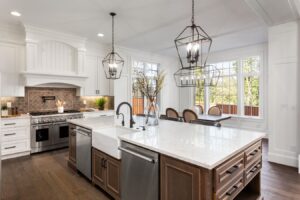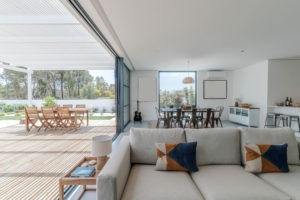Building a home addition is one of the best investments you can make in your home. It allows you to increase both the square footage as well as the value marketing of your home. Once you start the process of designing and building onto your home, you’ll come to find that there are many different forms a home addition can take and factors to think about before building. The right addition for your home will depend on your current layout, size, and style, as well as your needs and project goals.
We’ve put together a list of the top five things to keep in mind when considering adding on to your home:
1. How your new space will compliment your home
One of the most important things to think about before you start building your home addition is how it will affect and complement your existing space. Your home’s layout, style, and size will dictate what type of addition will work best so that it flows seamlessly on the inside and out.
Often people think about what kind of addition they want to build to meet their needs and goals, when in reality, determining where you’re going to build is just as important. Start by thinking about the features in your home that you want to highlight or add on to. A good designer and contractor will help you determine the best way to add to your home so your new space fits perfectly with your current layout and style.
For example, maybe you have a big backyard with a beautiful deck, so building an addition to overlook your outdoor space can improve the functionality and beauty of not only your addition, but also your existing space. If you’re building an extra bedroom, family room, game room, or gym, you might even think about adding a door to connect the room to your backyard.
2. Determine the kind of space you need
If you’re considering a home addition, you’ve already come to the conclusion that you need the extra space in your house for many reasons. Before getting too focused on a specific type of addition, it’s helpful to consider the many possibilities afforded by increased square footage.
The list of ideas for home additions is nearly endless, but here are a few common ones that can help both solve problems and add the value to your home that you’re looking for.
- Extra bedrooms
- Kitchen extensions
- In-law suites or guest suites
- Home offices
- Laundry rooms
- Home gyms
- Sunrooms
- Primary baths or suites
With a little bit of help from a contractor with design-build capabilities and outside-of-the box thinking, you may be able to incorporate more than one kind of space into your addition. For example, if you’re adding a master bathroom, you may also be able to incorporate a walk-in closet or laundry space in the same project. If you’re finishing out your basement, you could add in a kitchenette and small bathroom so your basement can also function as an in-law suite or guest quarters – even a future Airbnb or ADU!
3. Necessary permits and local regulations
Most, if not all home additions require building permits. While the process can be time consuming and complex, it’s not a step that should be skipped. If you decide to sell your home some day, you may be asked to show that everything was built up to code and with proper permits. You don’t want to spend all this time and money on a home addition for it to not return the investment you were expecting.
Building permits are issued at the local level, so they can vary from city to city. A good contractor should be familiar with your city’s requirements and can help guide you through the process. We are well versed in the permit requirements for all the cities we work in along the Central Coast. Acquiring permits for a home addition typically includes applications, planning approvals, inspections, and multiple visits to city hall, so having a knowledgeable contractor by your side for this process can be very helpful in speeding up the process.
4. Expected investment for an addition
The cost of a home addition can vary depending on the type of addition, the size, materials and features you want to include, the geographical location of your home, and many other factors. It’s important to find a knowledgeable, experienced contractor and designer so they can help guide you through the process and give you realistic estimates. Consulting a contractor early on with your budget and goals will help create a smooth process from start to finish.
Building with the existing footprint of your home is a great way to lower the overall cost of your addition. Although not everyone has the space available in their home, transforming an unfinished basement or attic rather than building onto your home can save you between 25 and 50 percent.
5. The value an addition can add to your home
Whether you’re planning on staying in your home for decades to come, or you’re expecting to sell your home in the next few years, it’s always important to consider how any remodeling or home addition project will impact the value of your home.
Adding usable square footage to your home is one of the best ways to increase the value quickly. Whether that’s finishing your basement, adding a sunroom, or building a whole second story to your home, this will automatically increase the home’s market value. It is important to remember though, that not all additions are created equal when it comes to boosting your value.
Adding a second story to your home or a primary suite typically adds the most value. That being said, the project that will give you the best return on your investment depends on many factors. Think about what your house is currently missing that might be desirable to potential buyers – laundry rooms and home offices are some of the more important rooms to typical homebuyers, and most are willing to pay extra for a finished basement, in-law suite or walk-in closets.
Expert advice you can trust
We enjoy serving Central Coast homeowners by bringing their home addition dreams to life. With decades of experience remodeling and building homes, we want to help you create more space and increase the value of your home with an addition that fits seamlessly inside and out.
If you’re ready to get started or just have questions about what kind of addition would fit your home best, fill out our contact form to get started today!


